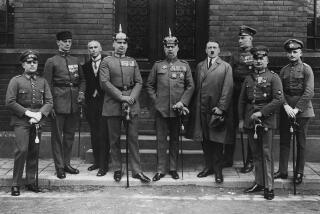Call for Honecker’s Release Tests German-Soviet Ties : Europe: Berlin wants to place the former leader under arrest. But he is reported to be ill--and he was once one of Moscow’s strongest allies.
- Share via
BERLIN — German attempts to arrest former East German Communist leader Erich Honecker for ordering border guards to kill anyone trying to flee his regime threatened Tuesday to turn into a test of the recently revived German-Soviet relationship.
“It’s an extremely sensitive question,” a German Foreign Ministry official commented Tuesday. “It is more political than judicial.”
Berlin justice authorities Saturday issued a warrant for Honecker’s arrest on the basis of two documents they say show that Honecker personally issued “shoot-to-kill” orders to East German guards patrolling the 867-mile-long inner-German frontier and the 100 miles of Berlin Wall.
By late Tuesday, the Soviet military command at the base where the 78-year-old deposed leader now lives had shown no sign of relinquishing Honecker to the Germans.
“We’ve asked the Soviet authorities to hand him over, and we are still waiting for an answer,” said Jutta Burkhardt, speaking for the Berlin regional court that issued the warrant. “We expect an answer through normal channels.”
Honecker, along with his wife, Margot, moved onto a Soviet military base at Beelitz, southwest of Berlin, last spring after spending several months after his October, 1989, ouster at the home of an East German Protestant pastor.
Two days after the warrant for his arrest was issued, Honecker was admitted to the Soviet military hospital at the base, reportedly complaining of high blood pressure.
Honecker’s translator and personal liaison with the Soviet authorities, Igor Molotkin, told reporters Monday that the former Communist leader has entered the hospital’s cardiac unit.
Honecker is believed to have spent several days in the hospital’s cardiac unit on at least one previous occasion and is said to be taking medicine to alleviate high blood pressure.
While any formal reply to the arrest warrant may come through Gen. Boris Smetkov, the ranking Soviet officer among the more than 350,000 Soviet troops still stationed in eastern Germany, the decision itself is anything but routine.
German government officials who declined to be identified said they expect that the question will probably be decided between Chancellor Helmut Kohl and Soviet President Mikhail S. Gorbachev.
“It is probably a Cabinet decision here,” said a senior German official who requested anonymity.
To a considerable extent, this official indicated, the German decision to press the case for Honecker’s arrest would depend on possible fallout for Gorbachev.
“Just consider what it means to the Soviet Union to give this man over to the German authorities--a man who a little more than one year ago was still the general secretary of a Communist party,” the official said. “He was general secretary at the same time as Gorbachev.”
So far, Soviet military authorities have declined to comment on the case, and a Berlin-based Soviet diplomat would only agree that the question is “difficult.”
Between the time the Berlin Wall was built in 1961 and its collapse 13 months ago, 201 East Germans were killed trying to flee the country.
Thousands of others made it to the West, despite the heavily fortified border equipped with mines and tripwire devices that sprayed shrapnel across a broad area.
The German arrest warrant cites a memorandum from the East German National Defense Council dated May, 1974, in which Honecker is alleged to have declared that “firearms must be ruthlessly used if attempts are made to flee across the border, and those comrades who use their weapons successfully are to be praised.”
Honecker was chairman of the council at the time.
The warrant also mentions a second memorandum, dated September, 1961, the month after the wall went up, in which Honecker is said to have ordered guards to shoot anyone “violating the border.”
One year after anti-Communist revolutions swept through Eastern Europe, only one leading Communist Party official--other than in Romania--has so far been tried and convicted of criminal acts--former Prague party boss Miroslav Stepan.
BACKGROUND
Former East German Communist leader Erich Honecker ruled his nation with an iron fist for 18 years. The son of an ardent Communist, he had been active in Communist groups since the age of 10. When the party was outlawed by Adolf Hitler, Honecker helped organize resistance to the Nazi regime. He was imprisoned for his activities. After the war, Honecker quickly rose through the ranks of power. In 1961, as a party secretary overseeing security affairs, he supervised the erection of the Berlin Wall. In 1971, he took over the party leadership. Staunchly loyal to the Kremlin, he held his grip on power until October, 1989, when a wave of democratic reform swept him out.
More to Read
Sign up for Essential California
The most important California stories and recommendations in your inbox every morning.
You may occasionally receive promotional content from the Los Angeles Times.













